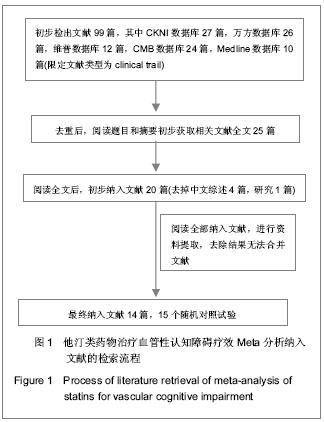• 组织构建循证医学 evidence-based medicine in tissue construction • 上一篇 下一篇
他汀类药物治疗血管性认知障碍的Meta分析
李 森,徐万鹏
- 中国医科大学附属第一医院神经内科,辽宁省沈阳市 110001
Meta-analysis of statins for treatment of vascular cognitive impairment
Li Sen, Xu Wan-peng
- Department of Neurology, First Affiliated Hospital, China Medical University, Shenyang 110001, Liaoning Province, China
摘要:
背景:国外研究显示,没有确切证据证明他汀类药物对血管性认知障碍的治疗有效。而国内有关他汀类药物对血管性痴呆疗效的研究样本量均较小,无法得出确切结论。 目的:采用Cochrane协作网推荐的方法对他汀类药物对血管性认知功能障碍的疗效进行Meta分析。 方法:计算机检索CNKI、万方、维普、CBM及Pubmed数据库,检索时间从建库至2013年1月,查找有关他汀类药物对血管性认知功能障碍疗效的随机对照试验,并手工检索进行相关补充。按纳入和排除标准选择文献,提取资料,进行方法学评估后,采用Revman5软件进行Meta分析。 结果与结论:通过检索最终纳入15个符合标准的随机对照试验,共计1 203例患者,其中他汀组616例,对照组587例,采用固定和随机效应模型对疗效指标简易智能量表及日常生活自理量表(包括14项评分法或Barthel指数评分)进行结果合并。与对照组相比,他汀组的简易智能量表评分(14个随机对照试验1 112例患者),MD=3.02,95%CI:2.26至3.77,P < 0.000 1;日常生活自理量表评分14项评分法(7个随机对照试验,513例患者),MD=-4.14,95%CI:-6.11至-2.18,P < 0.000 1;Barthel 指数评分(2个随机对照试验,171例患者),MD=11.62,95%CI:9.78至13.46,P < 0.001。纳入文献中共提及不良反应14例,对照组1例,他汀组13例,均为阿托伐他汀引起,他汀组不良反应率2.1%,无严重不良反应。现有文献证据表明,他汀类药物可以改善血管性认知障碍患者的认知功能,且安全性良好。但进一步的结论尚需更高质量的随机对照试验进行验证。
中图分类号:


